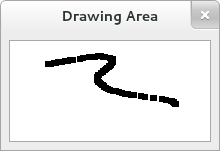绘制
优质
小牛编辑
139浏览
2023-12-01
许多插件,比如buttons,自己就做了它们所有的绘制工作。比如你仅仅需要告诉它们你想看到的标签、你想它们使用的字体、绘制按钮的轮廓和焦点矩形。有时候,有必要做些自定义的绘制。在这种情况下,一个 GtkDrawingArea控件可能是正确的选择,这个控件提供了一个画布,在这个画布上你可以绘制并且将其连接到”draw“信号。
控件的内容常常需要被部分或者全部重新绘制。比如,当另一个窗口控件被移动并且露出控件的一部分,或者当包含它的窗口重新调整大小时,也会导致控件的部分或者全部被重新绘制。通过调用 gtk_widget_queue_draw()或者它的变体,GTK+提供一个现成的cairo给绘制信号从而实现众多细节。
下面的程序将会展示一个绘制信号句柄。这个例子比之前的略微复杂,因为它也通过button_press和motion_notify句柄显示出输入活动。

Example 3. Drawing in response to input
新建一个名为 example-3.c 的文件,写入如下内容:
#include <gtk/gtk.h>
/* Surface to store current scribbles */
static cairo_surface_t *surface = NULL;
static void clear_surface (void)
{
cairo_t *cr;
cr = cairo_create (surface);
cairo_set_source_rgb (cr, 1, 1, 1);
cairo_paint (cr);
cairo_destroy (cr);
}
/* Create a new surface of the appropriate size to store our scribbles */
static gboolean
configure_event_cb (GtkWidget *widget,
GdkEventConfigure *event,
gpointer data)
{
if (surface)
cairo_surface_destroy (surface);
surface = gdk_window_create_similar_surface (gtk_widget_get_window (widget),
CAIRO_CONTENT_COLOR,
gtk_widget_get_allocated_width (widget),
gtk_widget_get_allocated_height (widget));
/* Initialize the surface to white */
clear_surface ();
/* We've handled the configure event, no need for further processing. */
return TRUE;
}
/* Redraw the screen from the surface. Note that the ::draw
* * signal receives a ready-to-be-used cairo_t that is already
* * clipped to only draw the exposed areas of the widget
* */
static gboolean draw_cb (GtkWidget *widget,
cairo_t *cr,
gpointer data)
{
cairo_set_source_surface (cr, surface, 0, 0);
cairo_paint (cr);
return FALSE;
}
/* Draw a rectangle on the surface at the given position */
static void draw_brush (GtkWidget *widget,
gdouble x,
gdouble y)
{
cairo_t *cr;
/* Paint to the surface, where we store our state */
cr = cairo_create (surface);
cairo_rectangle (cr, x - 3, y - 3, 6, 6);
cairo_fill (cr);
cairo_destroy (cr);
/* Now invalidate the affected region of the drawing area. */
gtk_widget_queue_draw_area (widget, x - 3, y - 3, 6, 6);
}
/* Handle button press events by either drawing a rectangle
* or clearing the surface, depending on which button was pressed.
* The ::button-press signal handler receives a GdkEventButton
* struct which contains this information.
*/
static gboolean button_press_event_cb (GtkWidget *widget,
GdkEventButton *event,
gpointer data)
{
/* paranoia check, in case we haven't gotten a configure event */
if (surface == NULL)
return FALSE;
if (event->button == GDK_BUTTON_PRIMARY)
{
draw_brush (widget, event->x, event->y);
}
else if (event->button == GDK_BUTTON_SECONDARY)
{
clear_surface ();
gtk_widget_queue_draw (widget);
}
/* We've handled the event, stop processing */
return TRUE;
}
/* Handle motion events by continuing to draw if button 1 is
* still held down. The ::motion-notify signal handler receives
* a GdkEventMotion struct which contains this information.
*/
static gboolean
motion_notify_event_cb (GtkWidget *widget,
GdkEventMotion *event,
gpointer data)
{
/* paranoia check, in case we haven't gotten a configure event */
if (surface == NULL)
return FALSE;
if (event->state & GDK_BUTTON1_MASK)
draw_brush (widget, event->x, event->y);
/* We've handled it, stop processing */
return TRUE;
}
static void close_window (void)
{
if (surface)
cairo_surface_destroy (surface);
gtk_main_quit ();
}
int main (int argc, char *argv[])
{
GtkWidget *window;
GtkWidget *frame;
GtkWidget *da;
gtk_init (&argc, &argv);
window = gtk_window_new (GTK_WINDOW_TOPLEVEL);
gtk_window_set_title (GTK_WINDOW (window), "Drawing Area");
g_signal_connect (window, "destroy", G_CALLBACK (close_window), NULL);
gtk_container_set_border_width (GTK_CONTAINER (window), 8);
frame = gtk_frame_new (NULL);
gtk_frame_set_shadow_type (GTK_FRAME (frame), GTK_SHADOW_IN);
gtk_container_add (GTK_CONTAINER (window), frame);
da = gtk_drawing_area_new ();
/* set a minimum size */
gtk_widget_set_size_request (da, 100, 100);
gtk_container_add (GTK_CONTAINER (frame), da);
/* Signals used to handle the backing surface */
g_signal_connect (da, "draw",
G_CALLBACK (draw_cb), NULL);
g_signal_connect (da,"configure-event",
G_CALLBACK (configure_event_cb), NULL);
/* Event signals */
g_signal_connect (da, "motion-notify-event",
G_CALLBACK (motion_notify_event_cb), NULL);
g_signal_connect (da, "button-press-event",
G_CALLBACK (button_press_event_cb), NULL);
/* Ask to receive events the drawing area doesn't normally
* subscribe to. In particular, we need to ask for the
* button press and motion notify events that want to handle.
*/
gtk_widget_set_events (da, gtk_widget_get_events (da)
| GDK_BUTTON_PRESS_MASK
| GDK_POINTER_MOTION_MASK);
gtk_widget_show_all (window);
gtk_main ();
return 0;
}
然后在终端输入以下命令用GCC编译程序:
gcc `pkg-config --cflags gtk+-3.0` -o example-3 example-3.c `pkg-config --libs gtk+-3.0`

